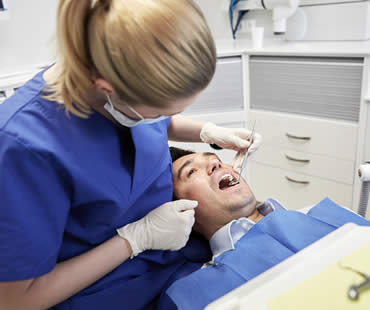
Dental implants provide an innovative solution for replacing missing teeth. A titanium rod is surgically placed in the jaw so that it can fuse with the bone, and ultimately an artificial tooth is placed on top to complete the process. This type of surgery is an intricate process that should be performed by a qualified and experienced dentist or oral surgeon. Even patients under the care of the most skilled professionals sometimes encounter problems with dental implants. Here are some risks to watch out for with this procedure.
Infection:
The most common concern with nearly any type of surgery is the possibility of infection. Oral surgery is no different, with the risk of infection related to tissue and gums. Carefully following the dentist’s instructions for aftercare and any restrictions is vital in avoiding infection.
Nerve and tissue damage:
During dental implant surgery, various nerves and tissue are involved. A qualified healthcare professional should have years of experience in carefully performing the surgery so that tissue and nerves are not damaged in the process.
Improper fusing:
One key element of a successful dental implant is for it to fuse properly with the jaw bone. If that does not occur, pain or other issues may result. The dental implant must be attached carefully and the patient must follow the recovery guidelines in order to help guarantee a successful outcome.
Dental implants are becoming more and more common to restore the function and appearance of a healthy mouth. The best way to steer clear of the risks associated with this procedure is to seek treatment from a reputable and well-established professional. Between having a high-quality procedure and making smart choices throughout recovery, the likelihood of a successful dental implant increases.
Our dental office is located in Haymarket

When you visit the dentist, you often see other professionals in the office. Usually, the dentist will have a hygienist and a dental assistant as part of the team. While their roles aren’t the same as the dentist’s job, these individuals do play an important part in your dental care. Understanding what the hygienist and dental assistant do can make you feel more comfortable at your dental appointments.
The Dental Assistant
To become a dental assistant, an individual usually completes course work through a community college or technical school. This training will provide hands-on experience before the dental assistant works in an actual dental practice. A dental assistant can serve many functions, including assisting the dentist during treatment, taking impressions, sterilizing instruments, and making temporary crowns for patients. Dental assistants also welcome patients and help them feel comfortable in the dental office.
The Dental Hygienist
At a minimum, a dental hygienist must earn an associate’s degree, though many hygienists choose to obtain four-year degrees. Additionally, hygienists must be licensed in the states where they practice. The dental hygienist is generally responsible for taking patient x-rays, performing an initial periodontal assessment, and cleaning your teeth. During your appointment, the hygienist will also offer tips on home hygiene to help you maximize your oral car routine. A dental hygienist may also perform deep cleanings for gum disease, apply fluoride, remove sutures, and administer local anesthetic.

One extremely common fear shared by many people is a fear of the dentist. Patients who possess this fear are often anxious and nervous about the sights, sounds and smells of a dentist’s office. Just imagining a routine visit can leave someone shaken and fearful, unable to sleep the nights prior to treatment.
Patients who share this common fear can put off necessary dental work. A fear of pain or needles can lead a patient to tolerate tooth pain or signs of infection in the mouth. If this sounds like you, talk to your dentist about sedation dentistry options.
Many people assume you must be fearful at a phobic level to benefit from sedation dentistry. This isn’t true! Sleeplessness, anxiety and low-level fear can all be helped with some form of sedation dentistry. Oral sedatives can be prescribed to be taken the night prior to a dentist visit, as well as the day of, to ensure a restful night’s sleep and an easy day before treatment.
Sedation dentistry during procedures is very safe, as you are monitored at all times by the dentist. Because of the deep level of relaxation possible utilizing sedation dentistry, more work can be done in a single visit, cutting down on trips to the dental office.
General dentistry procedures such as checkups, regular cleanings and cosmetic treatments can all be performed on a patient being treated with sedation dentistry. For a patient with fear and anxiety, each therapy can be made better with the addition of sedation dentistry.
Over time, with the use of sedation dentistry, some of your fears and anxieties can begin to lessen. Positive experiences can build up mental and emotional trust in the dentist, and patients can find that they need less and less of the sedation to feel comfortable.
We treat patients from Haymarket and the surrounding area

An estimated 50 million Americans have lost all their teeth, and 69 percent of adults are missing at least one tooth. Without a full set of teeth, you may deal with alignment problems, dietary restrictions, and self-esteem issues. With modern dentures, your dentist can renew your appearance and improve oral health.
Dentures are prosthetic appliances created to replace missing teeth. Full dentures are rows of false teeth that cover the upper, lower, or both arches. If you still have some of your natural teeth, your dentist may suggest a partial denture, which fits into the empty space in your smile like a puzzle piece.
How do dentures feel?
At first, your prosthesis may take some getting used to, so give your mouth time to adjust. You may have some difficulty with pronunciation, but that will pass.
Will my dentures need to be replaced?
As we age, our mouth tissues change. Over time, your dentures may need to be repositioned, realigned, or entirely remade. Never make changes to your appliance; contact your dentist if something doesn’t seem right.
How do I care for my dentures?
To protect your dental appliance, handle the denture with care. When you take the device out, always store it safely in its case. Gently clean your dentures with mild soap and water to remove bacteria. Make sure to put the denture out of reach from small children or pets.
Do I still need to brush if I have dentures?
Absolutely. Your gums still need proper oral care, so brush them twice daily to keep the tissue healthy.
We offer dentures at our Haymarket dental office

You finally have the smile of your dreams, so you want to make sure you take proper care of your bright new smile to keep it looking as fantastic as it makes you feel. Your cosmetic dental treatments and restorations can continue to look their best for many years with just a few dental health care tips and tricks:
- Use a non-abrasive fluoride toothpaste to avoid scratching and dulling the surface of your restorations. Just as you would with regular oral care, brush and floss two to three times per day immediately after meals, if possible.
- Avoid mouthwashes that contain alcohol which can damage fillings and deteriorate the bond between crowns and veneers.
- Limit between meal snacks and foods that are high in sugar that can promote decay and the development of cavities.
- Refrain from eating and drinking foods and beverages such as tea, wine, coffee, and berries that are notorious for staining the surface of teeth.
- Avoid chewing or biting on hard objects such as fingernails, pens or bottle caps.
- Wear a mouth guard when playing contact or combat sports.
- If you grind your teeth while sleeping, wear a night guard to avoid damage to your teeth or restorations.
- Maintain a regular schedule of bi-annual dental checkups and cleanings.
Although they will eventually need to be repeated or replaced, many cosmetic treatments and restorations can last as long as ten to fifteen years. With excellent care and attention, you can extend the life of your smile makeover and keep it looking fresh and fabulous for years. Take the time to take care of your smile, and it will reward you with years of beautiful smiles in return.
We look forward to seeing you in our Haymarket dental office

Wisdom teeth are the last adult teeth to erupt into the mouth, generally emerging between the ages of seventeen and twenty-one. They are the third set of molars and are in pairs: two each on the top and bottom arch of teeth. While some patients don’t have wisdom teeth, most do. Many of those who do have them don’t have enough room for those teeth to erupt fully, causing them to be wedged under the back of another tooth, impacted in the gum.
Impacted wisdom teeth are very difficult to clean, and can negatively affect the surrounding teeth. They are highly vulnerable to disease and decay and may lead to tooth pain and damage to adjacent teeth. For these and other reasons, a dentist may recommend that the teeth be extracted through oral surgery as soon as necessary to prevent any problems.
Extraction of wisdom teeth is typically an outpatient procedure done in an oral surgeon’s office. A healthy patient can proceed with a typical surgery, but if any infection is detected, the surgery can’t move forward until the infection is cleared up through the use of a full course of antibiotics. Once the surgery is moving forward, the surgeon’s team will administer some form of anesthesia to numb the area surrounding the tooth or to possibly sedate the patient through IV sedation dentistry.
After the anesthesia has fully taken effect, the surgeon makes an incision to open the gum and to remove any bone that is blocking the tooth from extraction. The tissue connecting the bone to the tooth will be separated and the tooth will be removed. In some cases, the surgeon will have to break the tooth into smaller pieces to make it easier to remove. After thoroughly cleaning the area and removing any remaining debris, the incision will be closed, stitched and packed with sterile cotton gauze to staunch any bleeding.
The surgeon will provide aftercare instructions. Patients should follow these instructions to the letter in order to ensure the best and fastest healing of the surgical site.
If you live in the Haymarket area contact us today











